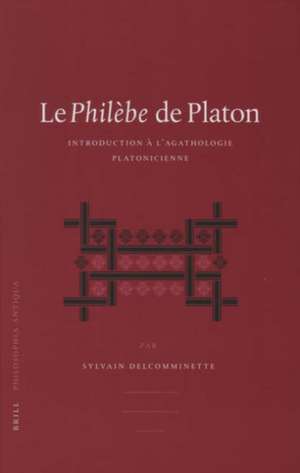Le <i>Philèbe</i> de Platon: Introduction à l’agathologie platonicienne: Philosophia Antiqua, cartea 100
Autor Sylvain Dr. Delcomminettefr Limba Franceză Hardback – 14 mai 2006
Din seria Philosophia Antiqua
- 18%
 Preț: 874.70 lei
Preț: 874.70 lei - 18%
 Preț: 1103.35 lei
Preț: 1103.35 lei - 18%
 Preț: 833.47 lei
Preț: 833.47 lei - 18%
 Preț: 717.59 lei
Preț: 717.59 lei - 18%
 Preț: 717.98 lei
Preț: 717.98 lei - 18%
 Preț: 867.45 lei
Preț: 867.45 lei - 18%
 Preț: 1075.31 lei
Preț: 1075.31 lei - 18%
 Preț: 1080.83 lei
Preț: 1080.83 lei - 18%
 Preț: 648.85 lei
Preț: 648.85 lei - 18%
 Preț: 647.21 lei
Preț: 647.21 lei - 18%
 Preț: 646.92 lei
Preț: 646.92 lei - 18%
 Preț: 716.05 lei
Preț: 716.05 lei - 18%
 Preț: 1364.79 lei
Preț: 1364.79 lei - 18%
 Preț: 831.94 lei
Preț: 831.94 lei - 18%
 Preț: 630.95 lei
Preț: 630.95 lei - 18%
 Preț: 707.86 lei
Preț: 707.86 lei - 18%
 Preț: 1171.85 lei
Preț: 1171.85 lei - 18%
 Preț: 611.05 lei
Preț: 611.05 lei - 18%
 Preț: 832.84 lei
Preț: 832.84 lei - 18%
 Preț: 645.66 lei
Preț: 645.66 lei - 18%
 Preț: 722.14 lei
Preț: 722.14 lei - 18%
 Preț: 705.76 lei
Preț: 705.76 lei - 18%
 Preț: 660.10 lei
Preț: 660.10 lei - 18%
 Preț: 907.78 lei
Preț: 907.78 lei - 18%
 Preț: 1222.36 lei
Preț: 1222.36 lei - 18%
 Preț: 589.06 lei
Preț: 589.06 lei - 18%
 Preț: 606.10 lei
Preț: 606.10 lei - 18%
 Preț: 706.39 lei
Preț: 706.39 lei - 18%
 Preț: 614.84 lei
Preț: 614.84 lei - 18%
 Preț: 831.30 lei
Preț: 831.30 lei - 18%
 Preț: 1184.09 lei
Preț: 1184.09 lei - 18%
 Preț: 772.74 lei
Preț: 772.74 lei - 18%
 Preț: 1388.49 lei
Preț: 1388.49 lei - 18%
 Preț: 1595.08 lei
Preț: 1595.08 lei - 18%
 Preț: 1148.87 lei
Preț: 1148.87 lei - 18%
 Preț: 828.57 lei
Preț: 828.57 lei - 18%
 Preț: 3418.43 lei
Preț: 3418.43 lei - 18%
 Preț: 788.38 lei
Preț: 788.38 lei - 18%
 Preț: 768.58 lei
Preț: 768.58 lei - 18%
 Preț: 738.14 lei
Preț: 738.14 lei - 18%
 Preț: 529.62 lei
Preț: 529.62 lei - 18%
 Preț: 724.12 lei
Preț: 724.12 lei - 18%
 Preț: 709.30 lei
Preț: 709.30 lei - 18%
 Preț: 684.57 lei
Preț: 684.57 lei - 18%
 Preț: 560.98 lei
Preț: 560.98 lei - 15%
 Preț: 499.51 lei
Preț: 499.51 lei - 18%
 Preț: 536.26 lei
Preț: 536.26 lei - 18%
 Preț: 659.85 lei
Preț: 659.85 lei - 18%
 Preț: 957.15 lei
Preț: 957.15 lei
Preț: 1110.31 lei
Preț vechi: 1354.04 lei
-18% Nou
Puncte Express: 1665
Preț estimativ în valută:
212.47€ • 219.52$ • 176.74£
212.47€ • 219.52$ • 176.74£
Carte indisponibilă temporar
Doresc să fiu notificat când acest titlu va fi disponibil:
Se trimite...
Preluare comenzi: 021 569.72.76
Specificații
ISBN-13: 9789004150263
ISBN-10: 9004150269
Pagini: 680
Dimensiuni: 164 x 245 x 48 mm
Greutate: 1.36 kg
Editura: Brill
Colecția Brill
Seria Philosophia Antiqua
ISBN-10: 9004150269
Pagini: 680
Dimensiuni: 164 x 245 x 48 mm
Greutate: 1.36 kg
Editura: Brill
Colecția Brill
Seria Philosophia Antiqua
Public țintă
All those interested in Plato and ancient philosophy in general, as well as philosophers interested in the relations between metaphysics and ethics.Notă biografică
Sylvain Delcomminette, Ph.D. (2003) in Philosophy, Université Libre de Bruxelles, has studied in Brussels and Cambridge. He is currently Postdoctoral Researcher at the Fonds National de la Recherche Scientifique (Belgium). He has published L' inventivité dialectique dans le Politique de Platon (Brussels, 2000).
Recenzii
"The book makes a signifficant contribution to the study of Plato that is essential reading for scholars at work on the Philibus." George Rudebusch, Ancient Philosophy 29 (2009)
